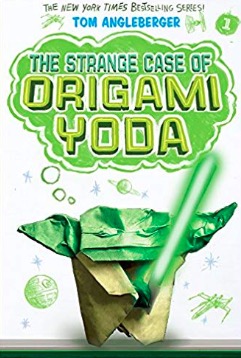This series of illustrated novels by the U.S. writer Tom Angleberger is so addictively enjoyable that your kid might just put down the video game console and devour them before the summer’s up
American author Tom Angleberger was inspired by the famous artist Fumiaki Kawahata’s origami Yoda when he wrote his charming series of books about a group of sixth graders who become better friends while making paper puppets in the likenesses of Star Wars characters.
Who could have imagined that such an esoteric beginning would spark a creative project that would spread so far and wide as Angleberger’s massively popular series?
With six books in the series and millions of copies sold, plus weeks and weeks on the New York Times bestseller list, this series is probably the most famous middle-aged literary phenom you’ve never heard of.
A lesser-known literary all-star
At least, it seems that way to me. Most of our middle-aged reader friends have read the Wimpy Kid series, which now has more than a dozen installments. But for some reason, Origami Yoda seems a lesser known series — at least here in Canada. When we share these books with friends, they’ve often never heard of them!? We think that’s bonkers. They’re so good-hearted.
Origami Yoda books are great for a range of reading abilities, with just enough graphic elements on each page to keep the page from looking gray and scary. That means more than one kid in your family can enjoy them. And they’re great for classroom reading and book clubs, too.
The story centers on a group of sixth graders who learn how to believe in themselves and accept their friends by listening to the peculiar wisdom dispensed by a paper Yoda puppet who spends a lot of time on the finger of a kid named Dwight. Dwight is known as weird, but when he speaks in the voice of Yoda, somehow he dispenses the right kind of cryptic wisdom, and the kids start to turn to him for help.
Starring … the weirdest kid in school
When Tom Angleberger recently spoke to kids in Roanoke, Va., about this book, he described where the character of Dwight actually came from: His own childhood.
“I had a very tumultuous three years of middle school and I remember it vividly,” he said. “So much of the book is true but at the same time not true … I was a complete loser in middle school. What if I had Origami Yoda? Much of the book is rewriting my own history.”
Angleberger’s compassionate treatment of the weirdest kid in school endears him and his books to every kid, ever. Dwight is weird, but there is wisdom in his weird. His friends learn to look past the quirks to see his connection to the Force.
In fact, as this series unfolds, it becomes clear that, in one way or another, every kid is the weirdest kid in school, and likewise, every kid can access the Force. Even Harvey, the annoying bully of the first two books, turns into a decent human being by the end of book three, The Secret of the Fortune Wookie.
What a safe community looks like
The most loveable thing about these books, though, is how the multiple points of view create a strong sense of community and diversity. The community is a character, and I just swoon over that.
The individual characters are well-drawn, too. Tommy, Kellen, Harvey, Sara, Stookie, throughout the series, many kids contribute chapters in a first-person voice. Every kid has a place in the story, a chance to speak their truth. Sure, they have differences, but they learn to get along okay and live together.
Especially because we live in a fragmented reality in which adults can’t seem to get along or accept each other’s differences, we need books that depict supportive communities.
(I love the word community. If there were a word cloud of my daily conversations…)
A progressive worldview
I love how Angleberger avoids gender stereotypes in his novels, and how his books are not marketed for either boys or girls. The female characters can be tough, and the male ones can be vulnerable.
The same cannot be said for Wimpy Kid. I do enjoy the famous series about Greg Heffley, but I find the predictable gender stereotypes in the book disappointing and outdated.
Angleberger openly challenges gender stereotypes in his most recent picture-book publication, The Princess and the Pit Stop. With a rainbow-coloured exhaust cloud streaming out behind her, this princess zooms past fairytale endings of yesteryear.
As well, Angleberger has spoken openly about brain differences. In a 2015 Guardian article, he described his Asperger’s as part of his superpower as an author: “My entire career as an author – which is a very fun one! – is entirely dependent on this condition.”
He wrote a brief, first-person article worth sharing with any kid who reads the book.
In fact, Angleberger speaks heroically about a lot of things. I particularly appreciate his outspokenness about how U.S. officials separate immigrant families at the border. He recently gave 100 per cent of the advance he got for The Princess and the Pit Stop to RAICES, an organization that helps immigrant families in Texas.
I think that’s cool.
Like this review? For more reading recommendations, sign up for my newsletter.

Published by